Volcanoes
A volcano is a mountain that opens downward to a reservoir of molten rock below the surface of the Earth. When pressure builds up, eruptions occur. Gases and rock shoot up through the opening and spill over or fill the air with lava fragments. Eruptions can cause lateral blasts, lava flows, hot ash flows, mudslides, avalanches, falling ash, and floods.
Types of Volcanoes
- Shield Volcanoes: These are large, broad volcanoes with shallow-sloping sides. They are formed by the flow of low-viscosity basaltic lava.
- Stratovolcanoes: Also known as composite volcanoes, they are tall, steep-sided volcanoes built by both lava flows and explosive eruptions.
- Cinder Cone Volcanoes: These are the smallest type of volcano, and they often form on the sides of larger volcanoes. They are made up of ash, cinders, and volcanic rocks.
Volcanic Eruptions
Volcanic eruptions can be explosive or effusive. Explosive eruptions involve the release of gas, ash, and magma in a violent manner, while effusive eruptions involve the relatively gentle outpouring of lava onto the surface.
Study Guide
- What is a volcano?
- Describe the different types of volcanoes.
- Explain the difference between explosive and effusive volcanic eruptions.
- What are the potential hazards associated with volcanic eruptions?
- How are volcanic eruptions monitored and predicted?
- Discuss the role of volcanoes in shaping the Earth's surface.
Understanding the different types of volcanoes, their eruptions, and associated hazards is essential for comprehending the geological processes that shape our planet.
[Volcanoes] Related Worksheets and Study Guides:
.◂Science Worksheets and Study Guides Sixth Grade. Plate Tectonics
Worksheet/Answer key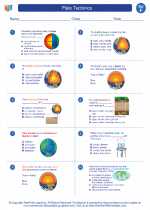 Plate Tectonics
Plate Tectonics  Worksheet/Answer key
Worksheet/Answer key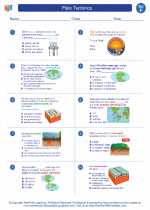 Plate Tectonics
Plate Tectonics  Worksheet/Answer key
Worksheet/Answer key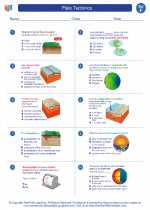 Plate Tectonics
Plate Tectonics  Vocabulary/Answer key
Vocabulary/Answer key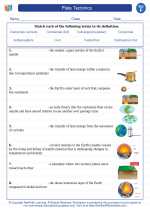 Plate Tectonics
Plate Tectonics  Vocabulary/Answer key
Vocabulary/Answer key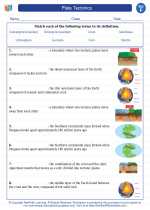 Plate Tectonics
Plate Tectonics  Vocabulary/Answer key
Vocabulary/Answer key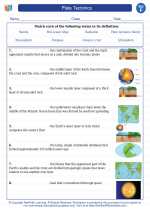 Plate Tectonics
Plate Tectonics  Vocabulary/Answer key
Vocabulary/Answer key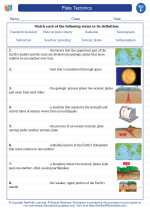 Plate Tectonics
Plate Tectonics 

 Worksheet/Answer key
Worksheet/Answer key
 Worksheet/Answer key
Worksheet/Answer key
 Vocabulary/Answer key
Vocabulary/Answer key
 Vocabulary/Answer key
Vocabulary/Answer key
 Vocabulary/Answer key
Vocabulary/Answer key
 Vocabulary/Answer key
Vocabulary/Answer key

The resources above cover the following skills:
EARTH AND SPACE SCIENCE
Earth’s Systems
Use evidence to explain how different geologic processes shape Earth’s history over widely varying scales of space and time (e.g., chemical and physical erosion; tectonic plate processes; volcanic eruptions; meteor impacts; regional geographical features, including Alabama fault lines, Rickwood Caverns, and Wetumpka Impact Crater).
Provide evidence from data of the distribution of fossils and rocks, continental shapes, and seafloor structures to explain past plate motions.
Use models to explain how the flow of Earth’s internal energy drives a cycling of matter between Earth’s surface and deep interior causing plate movements (e.g., mid-ocean ridges, ocean trenches, volcanoes, earthquakes, mountains, rift valleys, volcanic islands).